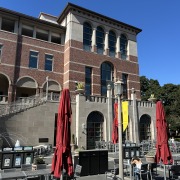‘Omni Loop’ takes a bit too much on its plate
The recent release starring Mary-Louise Parker and Ayo Edebiri creates more questions than answers.
By NANDINI NAG
3

Ayo Edebiri and Mary-Louise Parker starred in “Omni Loop.” (Magnolia Pictures)
With a black hole in her heart and five days left to live, a once-promising physicist, Zoya Lowe (Mary-Louise Parker), finds herself on a mission to figure out how to survive. Bernardo Britto’s film, “Omni Loop,” takes the familiar time loop trope and adds a layer of science fiction and existential drama. What starts as a farewell with her family soon turns into a mind-bending, but somewhat cluttered, narrative about life, time and regret.
The film starts inside a hospital, where it is revealed Zoya has a black hole growing in her chest and only has five days left to live. Zoya — who doesn’t seem fazed by this diagnosis — goes home to spend her final days with her family. However, on her fifth day, just as she’s about to die, Zoya takes a mysterious green pill that transports her back five days prior, only to repeat the entire process over and over again. It is revealed that Zoya willingly puts herself in a time loop with these pills and has lived this week many times already, thus explaining her detachment.
Daily headlines, sent straight to your inbox.
Subscribe to our newsletter to keep up with the latest at and around USC.
The audience is drawn into the film’s melancholic portrayal of Zoya’s growing frustration and boredom as she endlessly relives these final days in an effort to stay alive. She has heard the doctor’s diagnosis, adjusted her will, said goodbye to her elderly mother and so much more countless times. At this point, Zoya is itching for change.
In one iteration of her final days, Zoya suffers an anxiety attack and strays from the usual timeline, bumping into Paula Campos (Ayo Edebiri), a physics student who becomes an unlikely companion in Zoya’s quest to break free from her fate. In every iteration thereafter, Zoya immediately runs away from her family to find Paula. She convinces Paula to help her study these mysterious pills and help her travel back in time many years, not just five days.
Through Zoya and Paula’s relationship, it is revealed that Zoya’s promising career in physics was never fully realized due to her lack of ambition. Her desire to go back in time is not just to delay her death, but to make something more of her life.
While the first half of “Omni Loop” promises an exploration of time travel and Zoya’s scientific curiosity, it shifts focus toward her emotional journey. While this concept should seemingly bring depth to the characters and plot, the film falters here as it struggles to balance its many ideas — Zoya’s regret, Paula’s parallel longing to go back in time and their unspoken bond.
Edebiri brings a grounded energy to Paula, though the film doesn’t give her character much to do beyond serving Zoya’s narrative. Despite her intriguing introduction, Paula ends up feeling like a plot device rather than a fully realized character. The promise of her role never fully materializes, leaving the audience wanting more.
Still, Parker delivers a heart-wrenching performance as Zoya wrestles with the weight of her choices. From her early apathy toward life to her eventual reconnection with her family, the emotional shift is both heartfelt and palpable.
The pacing, however, becomes disjointed as “Omni Loop” shifts to emotional drama. The subplot involving Zoya’s deceased colleague, Mark (Eddie Cahill), and her strained relationship with her professor (Harris Yulin) feels tacked on, detracting from the film’s main focus. While these elements may have been introduced to deepen Zoya’s character, they ultimately create more questions than answers.
The film reaches its climax when Zoya, after repeated failures in her scientific experiment with Paula, chooses to spend her final iteration with her family. This decision leads to a bittersweet ending as Zoya passes away with a sense of peace she didn’t have at the film’s start.
The cinematography is remarkable, with Britto’s use of jarring cuts and scene transitions, which immerse the audience in Zoya’s heightened anxiety. However, the film’s ambition ultimately leads to its downfall. With too many subplots and underdeveloped characters, it feels like “Omni Loop” is trying to do too much in its 107-minute runtime. The film’s most intriguing ideas are left unexplored and underutilized by the end.
At its core, “Omni Loop” is a story about reconciling with the past and appreciating the present through the lens of death. While it falls short in fully developing its narrative threads, the film is still an intriguing and emotional take on the time loop genre. As director Bernardo Britto likes to call it, it’s a “life-affirming movie about death.”
DONATION PLUG – PLEASE DO NOT TOUCH
Thank you for reading the Daily Trojan.
We are the only independent newspaper here at USC, run at every level by students. That means we aren’t tied down by any other interests but those of readers like you: the students, faculty, staff and South Central residents that together make up the USC community.
Independence is a double-edged sword: We have a unique lens into the University’s actions and policies, and can hold powerful figures accountable when others cannot. But that also means our budget is severely limited. We’re already spread thin as we compensate the writers, photographers, artists, designers and editors whose incredible work you see in our daily paper; as we work to revamp and expand our digital presence, we now have additional staff making podcasts, videos, webpages, our first ever magazine and social media content, who are at risk of being unable to receive the support they deserve.
We are therefore indebted to readers like you, who, by supporting us, help keep our paper daily (we are the only remaining college paper on the West Coast that prints every single weekday), independent, free and widely accessible.
Please consider supporting us. Even $1 goes a long way in supporting our work; if you are able, you can also support us with monthly, or even annual, donations. Thank you.









